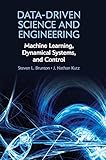Data-driven science and engineering : machine learning, dynamical systems, and control / Steven L. Brunton, University of Washington, J. Nathan Kutz, University of Washington.
By: Brunton, Steven L. (Steven Lee) [author.].
Contributor(s): Kutz, Jose Nathan [author.].
Publisher: Cambridge : Cambridge University Press, ©2019Description: 472 p.Content type: text Media type: unmediated Carrier type: volumeISBN: 9781108422093 (hardback : alk. paper).Subject(s): Engineering -- Data processing | Science -- Data processing | Mathematical analysisGenre/Form: Print books.Summary: "Data-driven discovery is revolutionizing the modelling, prediction, and control of complex systems. This textbook brings together machine learning, engineering mathematics, and mathematical physics to integrate modelling and control of dynamical systems with modern methods in data science. It highlights many of the recent advances in scientific computing that enable data-driven methods to be applied to a diverse range of complex systems, such as turbulence, the brain, climate, epidemiology, finance, robotics, and autonomy. Aimed at advanced undergraduate and beginning graduate students in the engineering and physical sciences, the text presents a range of topics and methods from introductory to state of the art"--| Current location | Call number | Status | Date due | Barcode | Item holds |
|---|---|---|---|---|---|
| On Shelf | TA330 .B78 2019 (Browse shelf) | Available | AU00000000016621 |
Includes bibliographical references and index.
"Data-driven discovery is revolutionizing the modelling, prediction, and control of complex systems. This textbook brings together machine learning, engineering mathematics, and mathematical physics to integrate modelling and control of dynamical systems with modern methods in data science. It highlights many of the recent advances in scientific computing that enable data-driven methods to be applied to a diverse range of complex systems, such as turbulence, the brain, climate, epidemiology, finance, robotics, and autonomy. Aimed at advanced undergraduate and beginning graduate students in the engineering and physical sciences, the text presents a range of topics and methods from introductory to state of the art"--


